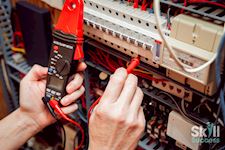Electrical Power Equipment Course
Skill Success
Summary
- Certificate of completion - Free
- Tutor is available to students
Add to basket or enquire
Overview
This course includes lifetime access so you can complete the course at your own speed.
By taking this course today, you will learn how electrical equipment operate and how they fit together into a network.
This can be the beginning of developing a valuable skill and begin a rewarding career.
Benefits of taking this course include:
- Unlimited and lifetime access to the course
- Learn the course at your own pace
- Course can be accessed on any platform
- 24/7 Customer support
Course media
Description
Electrical utilities around the world generate and transmit electrical energy that we all use for our everyday lives. This course starts off covering some basic subjects which are needed so that you can understand how the electrical power equipments are designed, operated and installed.
We then go on to study all of the main equipments that go into an electrical power system, before finally seeing how the power network itself is designed and operated.
The course consists of the following sections:
- Conductors And Insulators
- Circuit Breakers
- Grounding
- Network Design
- Low Voltage Systems
- Electrical Cables
- Overhead Lines
- Transformers
At the end of the course you will understand all of the main elements within a power utilities network and understand how they operate together as one seamless system.
What are the requirements?
- Completion of the electrical power engineering principles course
- You should be familiar with basic electrical knowledge of voltage, current & power
What will I learn?
- Understand why the electrical power network looks the way it does
- Know all about the equipment used in the power network
- Be able to design a basic electrical power network
- Understand electrical clearances and how they are used to design equipments
- Know how to calculate output voltages and currents using the transformer turns ratio
- Know how electrical discrimination works and how it clears the fault by keeping the healthy electrical system connected
- Know the difference between insulators and conductors
- Understand how the circuit breaker types change as the voltages and currents increase
- Understand how a transmission overhead line is designed using electrical clearances
- Know how electrical power cables are designed, constructed and installed
- Understand how the low voltage system in a house is connected
- Identify the difference between grounded and ungrounded systems
- Know the difference between touch potentials and step potentials
Who is the target audience?
- This course is suitable for anyone interested in learning about the electrical power networks that are used throughout the world
- Electrical engineering graduates who are interested in getting some practical experience on how an electrical power network operates
The Electrical Power Equipment Coursewill cover the following topics:
Section 1 - Electrical Power Equipment
- Introduction
- Conductors And Insulators
- Circuit Breakers
- Grounding
- Network Design
- Low Voltage Systems
- Electrical Cables
- Transformers
- Electrical Power Equipment – Resources
Who is this course for?
This course is designed for those who are interested to learn about electrical power networks that are used throughout the world.
Requirements
Completion of the electrical power engineering principles course.
Career path
This course is recommended for electrical engineer who are interested in getting some practical experience on how an electrical power network operates.
Questions and answers
do they issued certificate at the end of this course?
Answer:Hi Gideon, yes, the certificate of completion is automatically generated once you've completed the course.
This was helpful.
Certificates
Certificate of completion
Digital certificate - Included
Reviews
Legal information
This course is advertised on reed.co.uk by the Course Provider, whose terms and conditions apply. Purchases are made directly from the Course Provider, and as such, content and materials are supplied by the Course Provider directly. Reed is acting as agent and not reseller in relation to this course. Reed's only responsibility is to facilitate your payment for the course. It is your responsibility to review and agree to the Course Provider's terms and conditions and satisfy yourself as to the suitability of the course you intend to purchase. Reed will not have any responsibility for the content of the course and/or associated materials.


